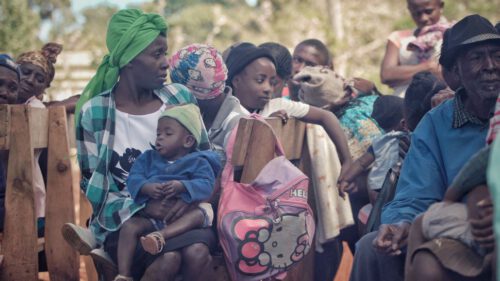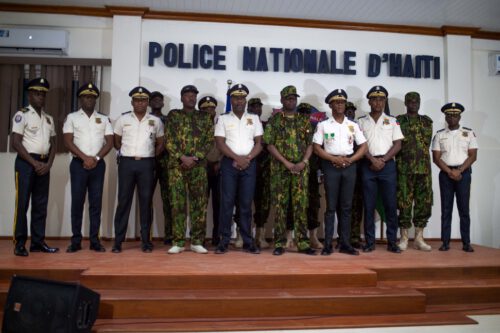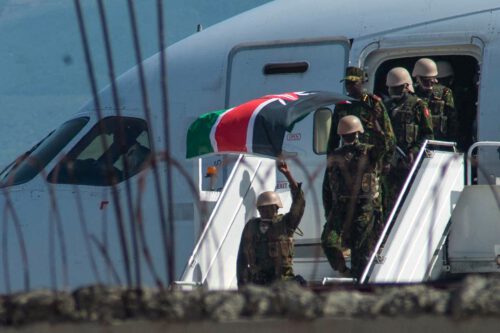Article
Fact-based, data-driven research and analysis to advance democratic debate on vital issues shaping people’s lives.
Center for Economic and Policy Research
1611 Connecticut Ave. NW
Suite 400
Washington, DC 20009
Tel: 202-293-5380
Fax: 202-588-1356
https://cepr.net
Read Part 1: Timeline of Key Events, here.
In a crowded field of 54 presidential candidates, the top two finishers in last year’s elections were Jovenel Moïse (PHTK) and Jude Celestin (LAPEH). Third and fourth were Moïse Jean-Charles (Platfom Pitit Dessalines) and Maryse Narcisse (Fanmi Lavalas). Although the earlier vote was plagued by fraud and irregularities and the results were eventually discarded, the top four finishers on October 25, 2015 are expected to lead the pack of 27 candidates participating on Sunday, November 20. Here is a closer look at the principal candidates heading into this weekend’s election:
Jovenel Moïse is PHTK’s candidate. Prior to the 2015 elections when former President Martelly selected Moïse as his successor, the lanky agricultural businessman from the North was a political unknown. Moïse’s company Agritrans runs a banana plantation primarily for export in Trou-du-Nord and was set up with government financing under Martelly’s administration. During the campaign, Moïse has branded himself as “The Banana Man” (Nèg Bannann Nan). He promises to revitalize Haiti’s neglected agriculture and to remobilize Haiti’s military, which was disbanded in 1995.
While in office, Martelly campaigned aggressively for Moïse and was accused of using state resources to promote his party’s candidate. For this reason, Moïse was perceived by many as a weak Martelly surrogate. One irony of the long delay since last year’s vote is that PHTK’s Moïse may actually be in a better position now. Time has allowed him to step out from under Martelly’s shadow, posing as an opponent to the provisional government rather than the ruling party’s candidate. PHTK and its political allies in the parliament have accused the interim government and the CEP of being biased in favor of “Lavalas” and claimed that the elections may be rigged against them. They have also consistently questioned the legitimacy of the provisional president, even at one point calling on police officers to disobey orders.
After the Hurricane, PHTK leaders threatened the provisional government with street protests and legislative action if elections were not held within weeks of the storm and have been publicizing polling (notoriously suspect in Haiti) that shows Jovenel Moïse with the highest level of support among presidential candidates.
Haiti’s interminable election cycle has depleted the finances of many parties, but although PHTK is facing similar problems, they are likely the party with the deepest pockets. With greater access to resources, the party was able to continue to campaign – including in the hurricane-hit south where Moïse distributed aid to victims. Well-financed and with a cadre of international election advisors, PHTK has many factors working in their favor.
In their quest for the presidency, PHTK has allied with local politicians that, in some cases, have been tied to corruption, drug trafficking and other wrongdoing. Though the campaign has distanced itself from Martelly, there is lingering dissatisfaction with the previous government, bolstered by recent allegations of corruption, which could weigh on voter’s minds Sunday.
Jude Celestin, the second-place finisher in last year’s election and the leading figure in the boycott movement, is the candidate of Ligue alternative pour le progrès et l’émancipation haïtienne (LAPEH). In the 2010 election, Celestin competed under the banner of INITE, the party of then-president René Préval. Those elections were also plagued by widespread fraud, violence and irregularities, many stemming from the fact that elections were held in the same year as the devastating 2010 earthquake that killed hundreds of thousands and left more than a million displaced. An Organization of American States (OAS) commission recommended changing the results, removing Celestin from the race and replacing him with Michel Martelly, without providing evidence that Martelly had actually received more votes than Celestin. The US then issued diplomatic threats, including a possible cut off of desperately needed post-earthquake aid, in order force the Haitian government to accept the changes.
Many expected Celestin to eventually call off the boycott and participate in last year’s second-round election, but his position was unwavering and led to the cancellation of the election. His supporters consider him a savior for preventing the fraudulent elections from standing; adversaries see him as the primary cause of the political instability of the last year. After 2010 and his role in cancelling last year’s election, Celestin hasn’t made many friends in the international community, though many close to him have worked over the last year to reestablish a relationship.
Celestin has championed his boycott’s role in getting the rerun, and has pointed to his experience at CNE, the national construction company, to present himself as a builder who knows how to get things done. After the Hurricane, Celestin offered to rebuild a key bridge and construction equipment was seen plastered with his campaign image.
With the provisional president Privert coming from an allied political party, Celestin is perceived to have benefitted from the change in leadership. But it is important to note that the interim government consists of politicians from many different movements and it would be a mistake to think all, or even most, are willing or able to help his campaign.
Still Celestin, similar to PHTK, has received significant private sector backing and can likely count on support from those sectors that have historically been allied with President Préval, giving him a political machine that should be able to generate votes on election day. Still, it is interesting to note that of the three former presidents currently active in politics, Préval is the only one to not openly endorse a candidate. University professor Jacky Lumarque was Préval’s chosen candidate, but was excluded from participating by the previous electoral council under Martelly.
Moïse Jean-Charles, a former Senator from the North department, finished third in last year’s election and is once again expected to be a top vote getter. Jean-Charles was the leading opposition voice against the former Martelly government and led street protests against his rule. Jean-Charles joined Celestin in rejecting last year’s election results and initially supported the interim government and the decision to rerun the elections from scratch.
More recently, however, Pitit Dessalines has struck a similar tone as the other leading candidates in calling for elections to be held as soon as possible after hurricane Matthew. The party has also expressed discontent with the electoral apparatus and interim government and called for greater transparency, especially in the vote counting process.
Campaigning against the traditional ruling elite and transnational control of Haiti, Jean-Charles is perhaps the candidate most feared by many in the international community and business sector. Partially as a result, his campaign has suffered from a lack of funds and Jean-Charles has been far less visible this year than he was last year. Without a foil in office such as president Martelly, Jean-Charles could have a harder time motivating his supporters this time around, especially with the lack of funding.
The party can draw from its bases in Port-au-Prince and Cap-Haitien, the country’s two largest cities, but it is unclear if it has been able to extend its reach throughout all departments.
Pitit Dessalines and Moïse Jean-Charles have likely been the movement most impacted by the reemergence of former president Jean Bertrand Aristide during this year’s campaign. Jean-Charles was a popular youth leader in Aristide’s Lavalas movement before splitting with the party in recent years.
Dr. Maryse Narcisse of the Fanmi Lavalas party, the political movement started by Aristide, came in fourth last year but has put far more resources in to the race this year. Aristide, twice deposed in US-backed coups, was largely confined to his residence after returning from exile in 2011 due to political threats and a questionable house arrest order, but with Martelly out of the picture, he has since returned to the campaign trail, leading caravans across the country with Narcisse. Aristide appeared just once with Narcisse during the 2015 campaign.
The Lavalas party has been prevented from participating in politics in the past, and this is the first political campaign where Aristide has been in country and able to campaign since his 2004 ouster. Still, the party faces significant constraints. While Aristide is still able to generate support, he is also a highly polarizing figure with many among the upper and middle classes associating the former leader with violence, corruption and political turmoil. Among the left in Haiti, there is concern that the emergence of Aristide will pull votes away from Jean-Charles and allow for the passage of the two elite-backed candidates, Celestin and Jovenel Moïse to move on to a second round. Never the less, an alliance between Narcisse and Jean-Charles has never been seriously pursued.
The head of the electoral authority, Leopold Berlanger, was a leader of the opposition to Aristide that resulted in the 2004 coup, raising concerns about the impartiality of the electoral apparatus. The presence of industrialist Andy Apaid as an advisor to Berlanger working at the vote tabulation center – though since removed from his position – has added to the lack of trust.
Lavalas has come under criticism recently after Aristide was recorded at a campaign event last week calling for electoral protests if there is not a new president by February 7th. Some have interpreted the remarks as a threat of violence and Aristide was called in for questioning by the electoral council last week. Lavalas leaders have characterized the event as just a misinterpretation. Many other parties and candidates have made incendiary remarks over the last year and a half, without ever facing potential ramifications or questioning from the electoral authority.



![U.S. Secretary of State Hillary Rodham Clinton meets with Haiti Prime Minister Garry Conille at the U.S. Department of State in Washington, D.C., on February 8, 2012. [State Department photo/ Public Domain]](https://cepr.net/wp-content/uploads/2024/05/Haiti_Round_Up_17_Desktop-500x333.jpg)